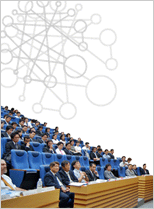WORKSHOP III: THE NEXT-GENERATION LIFESTYLE: UBIQUITOUS COMPUTING
Traditionally,
paradigm shifts in human lifestyle have been brought about by the needs
of the general public and the support from pertinent technologies. The
innovation of electricity accompanied by the yearning for personal
facilities gave rise to the development of electrical appliances that
now thrive in every household, while the need for swift voyage and the
technological enhancement in applied mechanics prompted the development
of automobiles and airplanes. Yet, the public now craves for more. The
development of a next-generation lifestyle, representing a faster, more
intelligent and more comfortable environment, has recently received a
heightened interest. This workshop will thus focus on the technological
development and social impact of the promising fields that will lead to
the next-generation lifestyle: Ubiquitous Computing.
The impact
of the ubiquitous society that numerous scholars have proposed will be
momentous for both the public and the industry. As can be easily
foreseen, the ubiquitous atmosphere will revolutionize the pattern of
one’s lifestyle. While house-keeping robots, interactive entertainment
media, and intelligent rooms provide changes in the household,
auto-drive automobiles, home-networking, and wearable computers will
advance novel opportunities and excite the public. Moreover, the
network of humans and non-human entities will also bring about
unprecedented chances and challenges to the industry.
Yet, the
advent of the ubiquitous society is confronted with unique challenges
in both technological and social development. Although researchers have
conducted extensive research on intelligent environments for the past
half century, the technology and social perception on the matter are
still in its infant stage. The miniaturization of integrated circuits,
the maturity of artificial intelligence and the integration of robots
into daily lives are some of the many problems to be resolved
technologically, while philosophical and ethical considerations,
privacy matters, and legal issues concerning the ubiquitous environment
are still under heated discussion among scholars.
Through this
workshop, ICISTS-KAIST 2005 aims to ponder both technological and
social issues in the next-generation lifestyle from different
perspectives. By gathering the opinions of experts from various realms
of specialties and from different parts of the world, ICISTS-KAIST 2005
hopes to provide a broad picture of the technology and its impact on
the future.
DAY 1 – July 20, 2005 (KAIST campus, Daejeon, Korea)
Session #1 – A Paradigm Shift in Computing: Past, Present, and Future
So
far, people in the IT field have strived for faster transmission,
larger capacity, smaller size, and better performance. This advancement
really has resulted in a paradigm shift in computing: from
computer-centered to human-centered. A key in human-centered computing
is not on network connectivity transparency (that is, how to
transparently provide a network connection to the service that the user
wants regardless of the user’s location), but on service connectivity
transparency (that is, how to transparently provide the service
required by the user without the user’s intervention). For this, there
need several technologies, such as sensing, context management, service
discovery, and dynamic reconfiguration. In this talk, the speaker will
present the evolution of computing and the present and future of
ubiquitous computing.
Speaker:
Dongman Lee, Professor, Information and Communications University
Session #2 – Ubiquitous Sensor Network and Next Generation Communication
Sensor
network has developed so far integrating a variety of networking
schemes. Tomorrow's network will not be dominated by a single
architecture but will combine various communication technologies such
as the World Wide Web, mobile phones, and sensors in living
environments. Theoretically, all objects in the ubiquitous world will
be assigned an Internet Protocol and will communicate through radio
frequency devices. In this session, the speakers will provide slight
technical details of how the networking among each object is feasible
wirelessly, and propose a number of problems related to sensor
networking. In addition, the speakers will introduce various real-world
applications utilizing sensor networking.
Speaker:
SeongHwan Cho, Assistant Professor, Korea Advanced Institute of Science and Technology
Jenq-Neng Hwang, Professor, University of Washington at Seattle
Session #3 – Student Discussion : What's the Next Big Thing?: Technology Paradigms in the 21st Century
Everyone's
talking about Digital Convergence. Now your cell phone is not just a
cell phone. It comes with an embedded camera that has a resolution of
2M pixels, an MP3 player that can store hundreds of songs, and a
function to communicate with satellites in space to receive TV signals.
Some of them have an embedded fingerprint recognition security system,
or a medical monitoring system that can automatically send messages to
the hospital. It seems like a ball of snow rolling down a hill. But is
it really what consumers want?
Now people are talking about
Ubiquitous computing. It's not a direct substitute of Digital
convergence but a concept that supersets it - people claim Digital
convergence will enable a Ubiquitous world. Reversing it, no success in
digital convergence means no Ubiquitous world. Herein lies the point of
this discussion. What is the driving force of this paradigm shift?
History
tells that all “Big Things” in the past were pushed by technology and
pulled by the market. Have we lost the “pull” from the market? Finding
the “Next Big Thing” is the core of this discussion (which is not
limited to Electrical Engineering).
Instructor:
Hyunwoo Noh, Graduate Student, Stanford University
DAY 2 – July 21, 2005 (KAIST campus, Daejeon, Korea)
Session #4 – In Preparation for a Ubiquitous Computing Society
The
development of new technology always fosters new businesses. From
mechanical to electronic systems, from vacuum tubes to semiconductor
circuits and ICs, from candles to light bulbs, every transition of
technology brought about extreme stir in industry and society. Thus it
is important to recognize what constitutes ubiquitous computing
technology. This session will provide viewpoints from the industry on
ubiquitous computing technology and related changes in society.
Speaker:
Joonki
Kim, Senior Vice President & Chief Research Officer, Digital
Research Center, Samsung Advanced Institute of Technology
Session #5 – Student Discussion: Do Technological Advancements Indicate Enhancement in Living Standards?
While
human society has experienced great revolutions since its
establishment, its revolutions have always been accompanied by
technological advancements. Thanks to such technological progress,
living conditions have improved globally: people can refresh themselves
with an air conditioner when hot, drive a car to travel, or gather
information from the Internet at speed unthinkable in the past. Yet,
the technological advancements also resulted in numerous drawbacks,
such as overwork and a greater cleft between the rich and the poor.
Then, could we assert that technological advancements always imply
better standard of living? What traits of technology have resulted in
impediments, and how could we eliminate such crisis? Throughout the
discussion, we are to introduce and ponder upon a number of problems
and its solutions related to the connection of society and technology.
Instructor:
Taeg Sang Cho, Workshop Leader, Korea Advanced Institute of Science and Technology
Ubiquitous Panel Discussion Session – Vision and Developing Strategies of the IT Complex
With
the maturation of IT technologies, various schemes to enhance IT
research environments have been proposed. Among them, developing an IT
complex has been considered the most feasible option, and South Korea
has designated Daeduk Valley, with KAIST at its center, as an IT
complex. Thus, through this panel discussion, we’d like to ponder upon
various impacts that the IT complex could bring about and propose a
number of suggestions in enhancing the research environment in an IT
complex
Some of the questions that we will consider are the following:
1. What is necessary for an IT complex to be successful?
2.
How should we balance the various interests from the academia, the
local government, and the industry? How can we improve the probability
of companies moving into the IT complex being successful?
3. How to
get resources? How to get connected? What can the
government/universities/private sectors do? Is it possible to develop
high-tech companies without regional industrial complexes?
Panels,
each from different sectors of occupations, will give us their distinct
and cutting-edge insights from very different points of view on both
domestic and global problems.
Panel Chair:
Sung-Deok Cha, Associate Professor, Korea Advanced Institute of Science and Technology
Panels:
Lak Kyoung Song, CEO, KTB Incubating
Stephen McDowell, Associate Professor, Florida State University
Sun Geun Kim, Professor, Daejeon University
DAY 3 – July 22, 2005 (KAIST campus, Seoul, Korea)
Session #6 – Ubiquitous Computing and Image Processing and Analysis
Both
visibly and invisibly, image processing technology has intruded into
our lives through numerous diverse applications. For example, computer
assisted-diagnosis methods are evolving to help physicians review data
from medical imaging devices. The increase in image data resulting from
recent technology advances in medical imaging exceeds the capabilities
of conventional manual techniques. Computer vision methods are now
being used in a wide range of areas including, business, manufacturing,
science, agriculture, security, and medical practice. In the
presentation the evolution of computer vision methods, present
applications and future expectations for realizing the ubiquitous world
will be discussed.
Speaker:
Anthony. P. Reeves, Associate Professor, Cornell University
Session #7 – A Downside to Ubiquitous Society
This
session will present an argument for why wireless technology will be
the key enabler for a truly ubiquitous computing environment, and why
we are also only at the beginning phase of realizing a completely
networked society. Obstacles to implementing this vision will also be
explored. As technologists, for example, we often don't consider the
societal consequences of our own designs. Like a coin, every technology
has two sides. For example, a large-scale sensor network may have
invaluable environmental and security applications, but this may come
at great cost to personal privacy. This session is intended both to
broaden participants’ interest in the networked world and to
acknowledge both beneficial and detrimental aspects of ubiquitous
computing technology. It will also give a few suggestions that might be
valuable in surmounting such problems.
Speaker:
Patrick Frantz, Executive & Technical Director, Rice University
Session #8 – Toward a Critical Technical Practice
By
the end of the 20th Century, with the Kyoto Protocol hanging, nuclear
proliferation a reality, and wars being fought over oil, it was clear
that as remarkable as Science and Engineering have been, they cause as
many problems as they solve. It's no longer possible for positivist
notions of progress to be spoken, except by salesmen or lobbyists. Yet
technical education continues to espouse a naive view of progress, and
to separate technical problems from problems that are seen as social,
environmental, political, and cultural ones. This leads not only to
unanticipated side-effects of technologies, but also to poorly designed
or conceived systems. What is needed is a radical re-theorization of
technology, leading to a resulting reformulation of technical
education. Phil Agre pointed to one possible refiguring of technical
work, through a technique he called 'critical technical practice'.
Several contemporary practitioners are adopting and modifying elements
of CTP, all sharing the common technique of keeping 'one foot planted
in the craft work of design and the other foot planted in the reflexive
work of critique'.
This talk will introduce several approaches to CTP and demonstrate technical systems built through it.
Panels:
Chris Csikszentmihlyi, Professor of Media Arts and Sciences, Massachusetts Institute of Technology
DAY 4 – July 23, 2005 (KAIST campus, Seoul, Korea)
Presentation – Business Plan of Ubiquitous Computing Items
We
have learned many technologies exploited in Ubiquitous Computing and
various real world applications leading our lives to a more comfortable
and enjoyable condition. Now, it is time for you to be the creator of
the ubiquitous world. Participants will be divided into several teams,
each representing a company. You must invent and design any goods or
services for the Ubiquitous Computing environment making the best use
of your knowledge. In addition, come up with a 5-year business plan for
your product. Creativity is the key to the product that will receive
the award. Good luck!


































